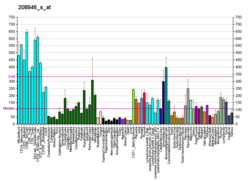Beclin-1 is a protein that in humans is encoded by the BECN1 gene.[5][6] Beclin-1 is a mammalian ortholog of the yeast autophagy-related gene 6 (Atg6) and BEC-1 in the C. elegans nematode.[7] This protein interacts with either BCL-2 or PI3k class III, playing a critical role in the regulation of both autophagy and cell death.
Role in disease
Beclin-1 plays an important role in tumorigenesis, and neurodegeneration, being implicated in the autophagic programmed cell death.[8] Ovarian cancer with upregulated autophagy has a less aggressive behavior and is more responsive to chemotherapy.[9]
Schizophrenia is associated with low levels of Beclin-1 in the hippocampus of those affected, which causes diminished autophagy which in turn results in increased neuronal cell death.[10]
Interactions
BECN1 has been shown to interact with:
Modulators
References
Further reading
External links
- Human BECN1 genome location and BECN1 gene details page in the UCSC Genome Browser.
- Overview of all the structural information available in the PDB for UniProt: Q14457 (Beclin-1) at the PDBe-KB.






